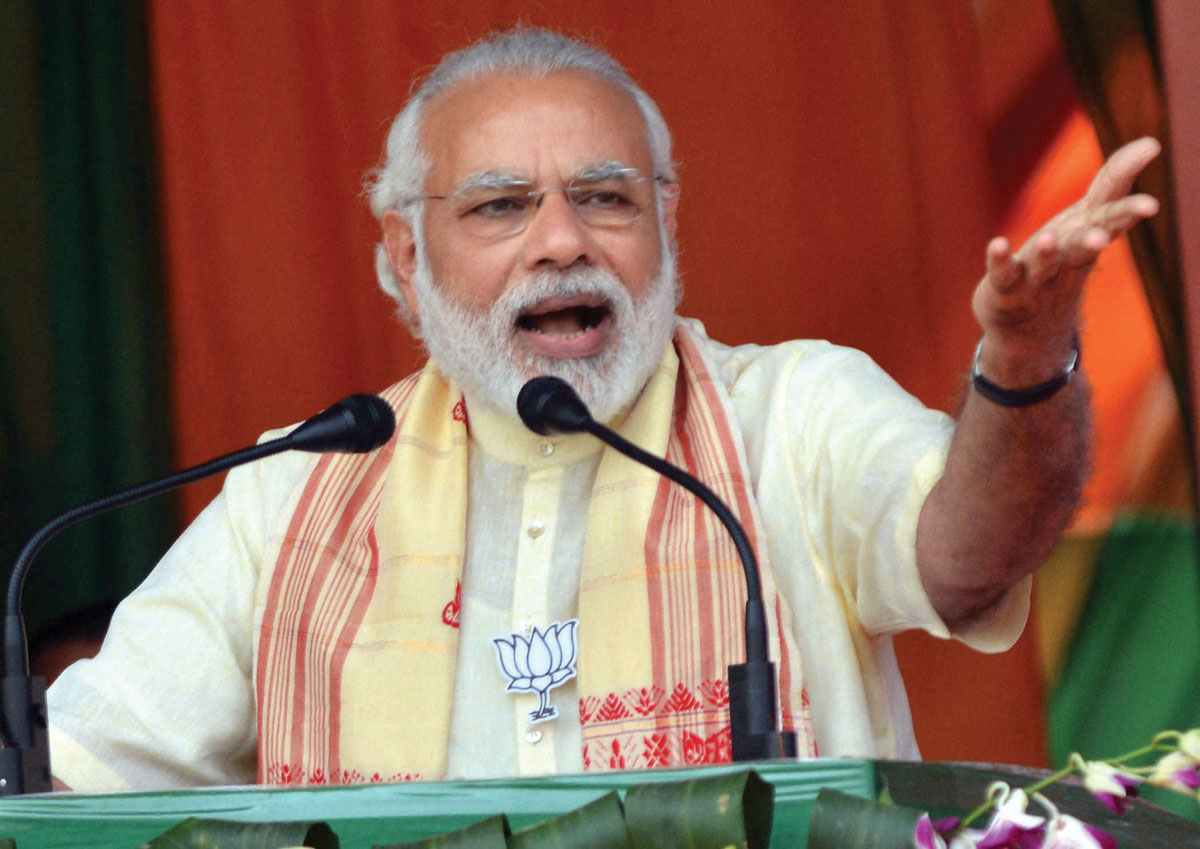MODI’S ‘ACHCHE DIN’
Prime Minister Narendra Modi addresses an election rally in Tinsukia, Assam, Mar. 26. (Press Trust of India)
The past few weeks have perhaps been the most productive for the Modi government in terms of achieving progress in much needed and long-awaited changes and reforms that will boost the economy. Analysts have gone so far to say that this could have been the best period for Modi as Prime Minister, had overzealous elements in the BJP not ruined it by orchestrating an unwarranted attack on students of JNU, slapping them with sedition charges, writes Siddharth Srivastava. (@Siliconeer, #Siliconeer, #narendramodi, #Indianreforms, #IndiaRealEstate)
Though the promised acche din is not going to happen in a hurry given India’s mass poverty, there is no doubt that the Modi administration is feeling the heat of electoral pledges made: growth, jobs and rise in income. Some reforms have been implemented as Parliament has functioned normally for a change. MP’s across political parties have been under enormous pressure from the public and the media to allow Parliament to do what it is meant to do, as enjoined in the Constitution: which is to debate issues, make laws, instead of being reduced to a forum of sloganeering, bickering and brinkmanship. The budget debate itself witnessed a lively speech by Congress President Rahul Gandhi in which he strongly criticized the crackdown on students in Delhi and Hyderabad. This was followed by an equally incisive response by Modi, who quoted Congress leaders such as Jawaharlal Nehru, Indira Gandhi and Rajiv Gandhi, on the need to ensure that the sanctity of informed debate in Parliament is maintained by all.
With Parliament finally back in business, the long-pending Real Estate Regulatory Bill has been enacted which is a big victory for India’s property sector. The new law will completely change the improvised and ad hoc way the sector has so far functioned, encouraged the use of black money, with end users the worst sufferers. India’s real estate sector has now taken a decisive step towards transparency, standardized processes, procedures and accountability guidelines that were woefully missing so far. The new law benefits serious developers, consumers, investors, lending institutions and government agencies involved in the buying and selling of property. Parliament has also passed the Aadhaar Bill, 2016, after an acrimonious, but welcome, debate. Despite some apprehensions about privacy, there is no doubt that the new law will provide for good governance and efficient, transparent, and targeted delivery of subsidies, benefits and services.
Importantly, Nandan Nilekani, the original architect of Aadhaar under the previous Manmohan Singh government, has said that the new bill has enough safeguards. “In fact, this (the Bill on privacy) is stronger than the original Bill. The Bill has very robust privacy protection beyond what any other legislation has ever provided in India. It is as good as it gets,” Nilekani has said. “World over every database is open for national security. In any country, national security concerns provides for authorities to access any system. The question is whether anyone will misuse it.”

The focus of the government now is enacting the Goods and Service Tax (GST) Bill, seen as a key tax reform measure to boost ease of doing business in India. So far, the GST Bill has not been passed as the ruling BJP does not have the numbers in the Upper House, the Rajya Sabha. This will change by July 2016 due to continuous process of new members being elected or nominated.
In the meantime, the government is looking to build bipartisan support by engaging with the opposition, the Congress Party, hoping to pass the Bill in the ongoing budget session of Parliament that ends in May. In any event, the GST Bill, that seeks to simplify India’s complex tax structure into a single levy at the point of consumption, should be a reality soon.
Beyond, Parliament, New Delhi has also, via executive action, approved the long-awaited and much delayed overhaul of the country’s hydrocarbon sector that has the potential to unlock oil and gas resources valued at $40 billion. The reforms have been welcomed by the industry that is already struggling due to the global price slump of commodity prices. Among the changes announced include freedom in gas pricing, uniform licensing for oil, gas and unconventional resources, and incorporating revenue sharing contracts (RSC) to substitute the controversial production sharing contracts (PSCs), a move that has been sought by industry for several years.
In a statement India’s ministry of oil and natural gas said: “The decisions taken will enhance domestic oil and gas production, bring substantial investment and generate employment. The policy is also aimed at enhancing transparency and reducing administrative discretion.”
The changes aim to encourage existing domestic players to commit more capital for E&P efforts. At the same time, the complete remodeling of the way the oil and gas sector has functioned seeks to create an enabling environment for overseas majors to invest in India. So far due to the infirmities in policy only a handful of companies, and that too mostly state-owned, have garnered bulk of the hydrocarbon resources. There is thus an attempt to undo and set right the prime reasons that have caused companies such as Exxon Mobil, Chevron and Royal Dutch Shell to shy away from auctions of energy blocks in India since they were instituted in 1999.
The problems have included high, arbitrary and retrospective taxation, opaque regulatory frameworks and domestic price controls that do not justify cost of production, especially in offshore and difficult areas. A case in point is UK major BP’s troubles with its over $7 billion investment in India via venture partner Reliance Industries Limited (RIL). BP-RIL and Canada’s Niko Resources joint efforts at the eastern offshore KG fields have failed to take off due to uncertainty about gas pricing and ongoing litigation linked to complex regulations.
“It (reforms) demonstrates the government’s firm intent to transform the oil and gas sector and enhance import substitution,” said BP, which has a 30% stake in several fields managed by RIL in India. The statement is a big concession by the company that has been has been a strident critic of India’s hydrocarbon policies over the recent years. No doubt, the past weeks could have very well been the best period of the Modi government that needs to make sure that it is not embroiled in needless controversies that the opposition is more than willing to rake up.


